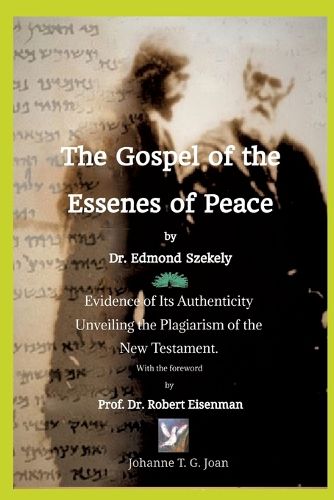Readings Newsletter
Become a Readings Member to make your shopping experience even easier.
Sign in or sign up for free!
You’re not far away from qualifying for FREE standard shipping within Australia
You’ve qualified for FREE standard shipping within Australia
The cart is loading…






Around 100 years ago, in 1923, Edmond Szekely came across a manuscript of unsuspected importance in the secret and dusty archives of the Vatican. This Gospel contained a mystery whose words and sermons seemed strangely familiar - almost as if they had been taken from the New Testament. But the parallels soon ended there, for the teachings of this gospel were clearly at odds with the established beliefs of the New Testament. The Essene Anabaptist, as I call him, taught personal responsibility. Whereas Christian doctrine presents man as fundamentally sinful and evil, and therefore incapable of observing God's commandments, and describes his quest for perfection as delusional, presumptuous and arrogant. The Essene Anabaptist revealed that perfection was man's goal on earth. A bold statement that runs counter to the foundations of established religion. In the New Testament, Jesus affirms the harmlessness of eating meat, whereas in the Essene Gospel, we are asked to consider, treat and protect animals as our brothers and sisters. The Essene Gospel declares the eating of meat to be the greatest sin - an attack on one's own body and soul. In the New Testament, Paul presents woman as a subject of man, while the Essene prophet praises her as the psychic force of man that he should listen to. And the earth itself, which plays no part in Christian teaching, is described by the Essene Baptist as our mother, to be cared for and preserved from harm. While the New Testament presents physical health as ephemeral and therefore undesirable, the Essene prophet sees physical purity and health as the foundation of spiritual salvation. He explained that all men were impure by nature, but that they held the key to health, happiness and perfection. The Essene prophet was not teaching a new religion, but a philosophy of life in harmony with nature. He was translating the language of nature, in which God has recorded his immutable laws, which have lasted since the creation of the earth and
$9.00 standard shipping within Australia
FREE standard shipping within Australia for orders over $100.00
Express & International shipping calculated at checkout
Around 100 years ago, in 1923, Edmond Szekely came across a manuscript of unsuspected importance in the secret and dusty archives of the Vatican. This Gospel contained a mystery whose words and sermons seemed strangely familiar - almost as if they had been taken from the New Testament. But the parallels soon ended there, for the teachings of this gospel were clearly at odds with the established beliefs of the New Testament. The Essene Anabaptist, as I call him, taught personal responsibility. Whereas Christian doctrine presents man as fundamentally sinful and evil, and therefore incapable of observing God's commandments, and describes his quest for perfection as delusional, presumptuous and arrogant. The Essene Anabaptist revealed that perfection was man's goal on earth. A bold statement that runs counter to the foundations of established religion. In the New Testament, Jesus affirms the harmlessness of eating meat, whereas in the Essene Gospel, we are asked to consider, treat and protect animals as our brothers and sisters. The Essene Gospel declares the eating of meat to be the greatest sin - an attack on one's own body and soul. In the New Testament, Paul presents woman as a subject of man, while the Essene prophet praises her as the psychic force of man that he should listen to. And the earth itself, which plays no part in Christian teaching, is described by the Essene Baptist as our mother, to be cared for and preserved from harm. While the New Testament presents physical health as ephemeral and therefore undesirable, the Essene prophet sees physical purity and health as the foundation of spiritual salvation. He explained that all men were impure by nature, but that they held the key to health, happiness and perfection. The Essene prophet was not teaching a new religion, but a philosophy of life in harmony with nature. He was translating the language of nature, in which God has recorded his immutable laws, which have lasted since the creation of the earth and